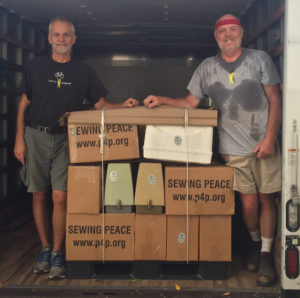By David Schweidenback
Fall 2019 Newsletter
A successful development project has several requirements. We respond to all requests yet are able to fulfill only a small portion of them. Our best answer is that we work where the world allows us to work.
- Our first necessity is a seaport. Shipping by water is cost-effective. Countries without seaports, especially countries deep in the interior of a continent, are much more expensive to get to. The cost of the overland shipping is double that of ocean-going freight.
- Our second necessity is a reasonable government at the destination. The shipping only arrives at the front door. It is the government of the destination country that opens the door to let you in. There are many countries that do not accept any used goods.
- Third and most important is a partner. We seek financial partnerships with the distributors of our bicycles and sewing machines. You equitably distribute a product in an economy by selling it. Just because you sell something doesn’t mean you have to charge a high price; it’s just that you need a mechanism to make the transaction work.
- Fourth and also critical is the funding. We beg for donations for the first load to get a program started. After that we use our original funding scheme, our revolving fund system: our partners share the costs of running their program. Through the process of distributing bicycles and sewing machines, our partners earn enough money to pay for the shipping of the next container and pay their ongoing business expenses, with some profit left over for the tertiary programs they run. All of our overseas partners have multiple other programs to help their societies; it’s not all bikes. But the bikes produce a constant stream of income to help pay for those other programs.
And then there was David Balaba, the mayor of Iganga, Uganda. Great guy. He didn’t have the first necessity, a seaport. His shipment went from New York through the Panama Canal past Singapore to Sri Lanka, was then shipped overland to Mombasa, Kenya. The cost to bring that shipment overland from Mombasa to Kampala was exactly double the cost of the entire ocean voyage.
David, the mayor of Iganga, did not have a reasonable government. Gaining entry to Uganda has always been difficult and costly. More on this later.
What the mayor did have was number three and number four. He had a solid plan for helping his community in northeastern Uganda. Plus he was able to secure funding from the Live your Mission Foundation. Two out of four — what could go wrong?
 On March 21, 2018, Sewing Peace loaded 69 sewing machines and sent them to Mayor David. They sailed away down the Atlantic, across the Caribbean, then across the Pacific into the Indian Ocean and made it to Mombasa on May 23, 2018. At some point during the next month they were probably transferred to the destination, Kampala, the capital of Uganda.
On March 21, 2018, Sewing Peace loaded 69 sewing machines and sent them to Mayor David. They sailed away down the Atlantic, across the Caribbean, then across the Pacific into the Indian Ocean and made it to Mombasa on May 23, 2018. At some point during the next month they were probably transferred to the destination, Kampala, the capital of Uganda.
Remember that second necessity up at the top. Mayor David had all of his paperwork in order. He is tax-exempt and is the mayor of a fairly good size town. All the i’s were dotted in the t’s were crossed. Ahh, number 2!
The government finally released the cargo in mid-September 2019, over 15 months after it arrived in the country.
